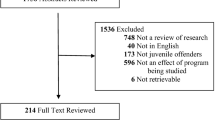Abstract
While America has increasingly become known for having a higher rate of persons in prison or under correctional supervision than any other country in the world; over the last two decades, new laws have begun emerging in America, placing restrictions on former offenders long after their correctional supervision has ended. These laws directly impact the lives of millions of ex-offenders who are no longer under correctional supervision, placing restrictions on where they may live, work and travel. The following essay, by a former offender who discharged parole in December 2000, highlights the punitive and destructive nature of these laws.
Similar content being viewed by others
References
Aukerman, M.J. 2005. The somewhat suspect class: Towards a constitutional framework for evaluating occupational restrictions affecting people with criminal records. The Journal of Law in Society 7: 18–87.
De Li, S., and D.L. MacKenzie. 2003. The gendered effects of adult social bonds on the criminal activities of probationers. Criminal Justice Review 28: 278–298.
Jones, R.S. 2003. Excon: Managing a spoiled identity. In Convict criminology, ed. J.I. Ross, and S.C. Richards. Belmont: Wadsworth.
Langan, P.A., and D.J. Levin. 2002. Recidivism of prisoners released in 1994. Washington: U.S. Department of Justice, Office of Justice Programs, Bureau of Justice Statistics.
Laub, J.H., and R.J. Sampson. 1993. Turning points in the life course: Why change matters to the study of crime. Criminology 31: 301–325.
Laub, J.H., and R.J. Sampson. 2001. Understanding desistance from crime. In Crime and justice: A review of research, ed. M. Tonry. Chicago: The University of Chicago Press.
Liptik, A. (April 23, 2008). Inmate count in U.S. dwarfs other nations. New York Times. http://www.nytimes.com/2008/04/23/us/23prison.html.
Terry, C.M. 2003. From C-block to academia: You can’t get there from here. In Convict criminology, ed. J.I. Ross, and S.C. Richards. Belmont: Wadsworth.
Travis, J. 2005. But they all come back: Facing the challenges of prisoner reentry. Washington: The Urban Institute.
Travis, J., A.L. Solomon, and M. Waul. 2001. From prison to home: The dimensions and consequences of prisoner reentry. Washington: The Urban Institute.
Uggen, C., and C. Kruttschnitt. 1998. Crime in the breaking: Gender differences in desistance. Law & Society Review 32: 339–366.
Author information
Authors and Affiliations
Corresponding author
Rights and permissions
About this article
Cite this article
Oliver, B.E. My Sentence Is Over But Will My Punishment Ever End. Dialect Anthropol 34, 447–451 (2010). https://doi.org/10.1007/s10624-010-9165-y
Published:
Issue Date:
DOI: https://doi.org/10.1007/s10624-010-9165-y




